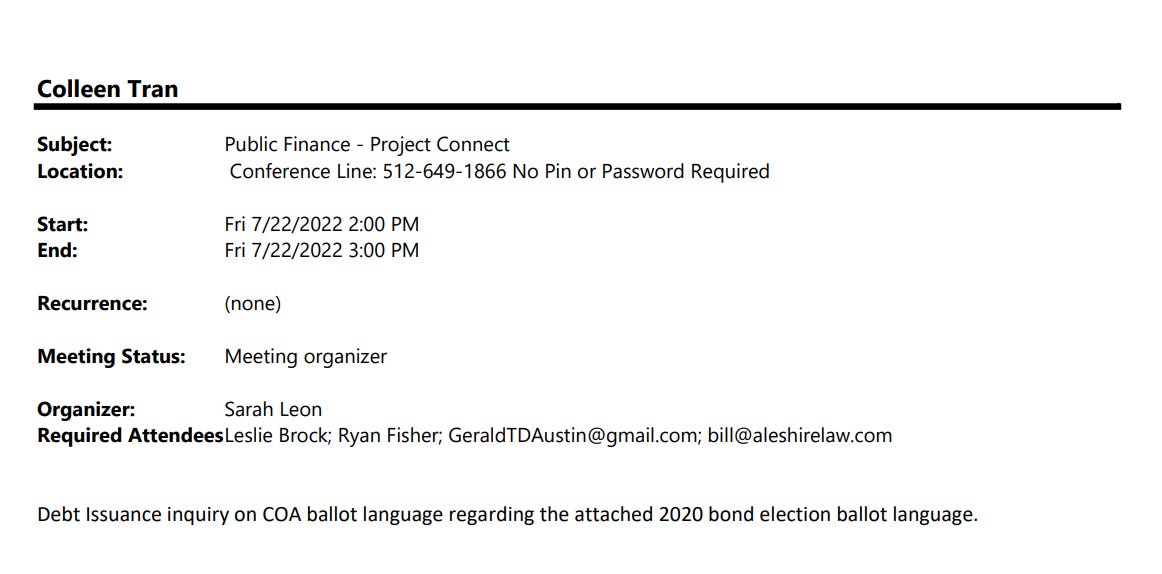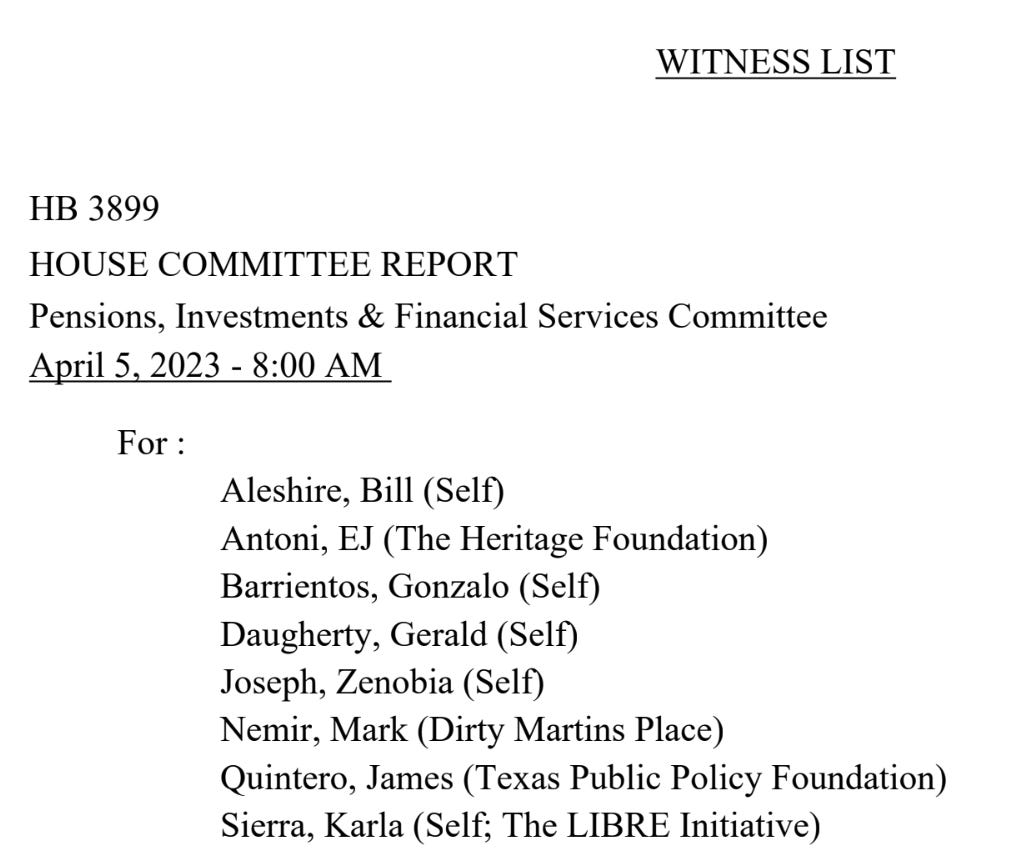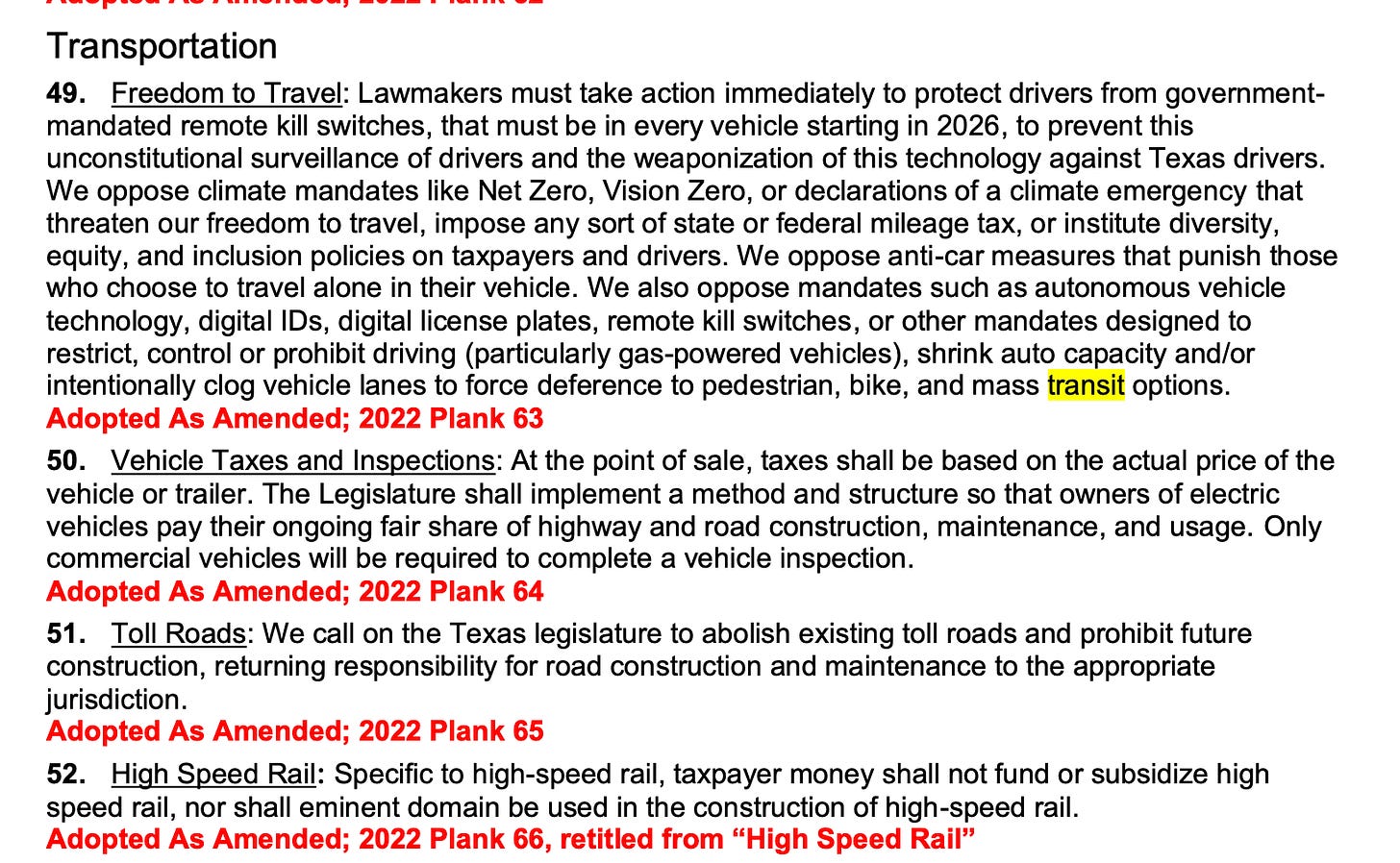Bill Aleshire's Secret Meeting with Ken Paxton' Office
Why is this Democrat working with Republicans to overturn a local election?
Welcome to the weekend edition of The Experiment, your official hopepunk newsletter. If you’d like to support my work, become a paid subscriber or check out the options below. But even if you don’t, this bugga free. Thanks for reading!
In 2020, Joe Biden beat Donald Trump in an election fair and square. Then he overcame numerous legal challenges and an armed insurrection aimed at overturning that election to take office. At the same time, voters in Austin turned back years of entrenched political opposition to light rail to pass a $7.1 billion transit plan called Project Connect. And even though it included an 8.75-cent property tax increase, the election wasn’t particularly close, passing by a nearly 2-1 margin, 57.9 percent to 42.1 percent.
Nevertheless, much as Republicans have made denying the truth of Biden’s win an article of faith, Texas Republicans have not stopped trying to overturn Austin’s 2020 transit election, aided, it seems, by a small number of Austin Democrats, led by one 75-year-old lawyer who calls himself a “transportation activist.” That septuagenarian’s name is Bill Aleshire.
That name appears on a previously unreported calendar appointment hosted by Sarah Leon, who works in intergovernmental relations for Republican Attorney General Ken Paxton. Also attending the July 22, 2022 meeting titled “Public Finance - Project Connect” were Assistant Attorney General Leslie Brock, Ryan Fisher (who was then Leslie’s boss), and former Travis County Commissioner Gerald Daugherty.
That Daugherty met with all those folks in the Texas Attorney General’s office to talk about Project Connect should surprise no one. After all, Daugherty, a Republican, helped defeat two previous campaigns that would have brought light rail to Austin, in 2000 and in 2014. And though Aleshire and Daugherty worked together against environmental activists on a road project in the ‘90s, it is somewhat surprising to see Aleshire’s name listed there for a couple reasons: for one, Aleshire is a Democrat, and two, the Project Connect election win was almost two years old at that point.
Since then, Aleshire and Paxton have been doing everything they can to overturn that election. And to understand why Aleshire, ostensibly an Austin Democrat, would be in effect colluding with Paxton, a Republican who overtly hates Austin, transit, and Democrats, you have to go back to the beginning.
Aleshire hasn’t always been an old man yelling at clouds, but he’s always been against things. Over the years he’s been called “a hyperactive Boy Scout,” “something of a pariah in local political circles,” “a fountain of unfettered opinion,” a “rolling ball of butcher knives,” and, in a triumph of understatement, “very difficult to work with.”
“Peace and quiet is not my top priority,” said Aleshire in 1998 as he was wrapping up five years as tax assessor-collector followed by 12 as county judge. “I've made folks mad. I don't take pleasure in that. I do take pleasure in agitating.”
“Peace and quiet is not my top priority”
He started out as a conscientious objector during the Vietnam War and never stopped being objectionable. In 1969, David Butts managed his losing campaign for student body president at East Texas State University. Later, he and Butts, who is still a Democratic political consultant in Austin, moved to Austin where Aleshire volunteered for reformist legislators including Sissy Farenthold and Lloyd Doggett, who is still a Democratic congressman in Austin. Then he went to work for the colorful and curmudgeonly state comptroller Bob Bullock, rising to the position of associate deputy comptroller before resigning in a self-righteous snit.
When he got bad service renewing his license plate, he decided to run against the Republican who ran the tax assessor-collector’s office that was in charge of license plates. He won and became popular by modernizing the place from a pen & paper operation to using computers and by raiding delinquent taxpayers.
Then he got elected to the top job in the county, Travis County Judge, an administrative and not a judicial position, where he mostly spent the next dozen years complaining.
“I can't think of any major accomplishment that Aleshire has had,” said a political rival. “Instead of proposing something, he focuses on ripping into other people's work.”
For example, Aleshire is credited with keeping Travis County out of a regional rail deal that could have connected Austin and San Antonio with a commuter rail line. He was good at being against stuff.
Said another, “Bill is convinced that he's the only honest, competent person. If you have a disagreement with him it's because you are incredibly stupid or dishonest. Nobody can just have a different view.”
When his last term expired in 1998, some county employees had countdown clocks on their screen savers to mark the time until he left office. But he wasn’t done with public life. He was off to law school so he could “spend the rest of my life helping make this system work for people,” he said. “I want to bring honor to the profession.”
I’ll leave it to you to decide whether or not he’s brought honor to lawyering, but he has conscientiously objected to any number of things over the years: updating a park, rewriting the city’s outdated land-use code, publicly funding affordable housing, even building the city’s Major League Soccer stadium, which he called “unlawful nonsense.”
Every fight was cast as righteousness and reason over corruption and stupidity (“Austin is being taken over by clever scheming special-interest Oligarchs,” he posted.). Every fight was picked at the edges, never on the direct merits of the thing in question. And that’s because in most cases stopping progress required Aleshire to stand against popular opinion. He can’t win the game, so he argues with the referee over the rulebook.
If Aleshire has made a late-in-life career out of playing lawyerball with Austin, what he and Paxton are doing to Project Connect constitutes lawfare.
To be fair, Project Connect’s financing structure makes an inviting target to transit opponents. Said one insider I talked to, “This is not a normal bond.”
He can’t win the game, so he argues with the referee over the rulebook.
The way things usually work with infrastructure projects, bonds pay for the bridge, road, or school, and an interest and sinking (I&S) tax that goes away once a project is paid for.
Project Connect proposed an unprecedented and clever use of M&O (maintenance and operation) property taxes, also called revenue bonds. Usually, a government body will issue revenue bonds used for short-term loans for cash flow purposes or to pay for smaller projects. You raise taxes and then use that money to build stuff—and in Project Connect’s case, to get federal matching funds.
No one had ever proposed using M&O taxes to create a dedicated funding stream to secure bonds for mass transit, but neither had anyone prohibited it. “It wasn’t illegal, but it wasn’t contemplated in state law,” said Ellen Troxclair, a former Republican Austin City Council member elected to the state legislature. In any case, all of this was offered up to the voters in a free and fair election, and scoreboard: 57.9% to 42.1%.
Around the time Aleshire was secretly meeting with Ken Paxton’s barristers, inflation ballooned construction costs, and the $7.1-billion price tag for Project Connect rose to more than $10 billion. Project Connect decided to scale back to fit a smaller project under the original price tag—which opponents called a bait & switch—but the terms of the bond passed by voters would have allowed Project Connect to spend more to pay for the originally promised light rail lines—which opponents called blank-check financing.
In 2023, Troxclair filed a bill to prohibit the financing arrangement that she had previously admitted was perfectly legal.
“If we fail to act we would be sanctioning an unprecedented blank-check financing model,” Troxclair said. “And if we do that local governments across the state are likely to use this model to finance capital projects.”
Good lord, next thing you know Texas cities might have all kinds of mass transit, modern and safe schools, and any manner of amenities. Texas had never contemplated the horrors implicit in this kind of good government, so in April 2023, a House committee held a hearing on HB 3899, Troxclair’s bill. Testifying in favor of the bill were representatives of LIBRE (a Koch brothers-funded, conservative Latino outreach effort), the Heritage Foundation (the source of Project 2025, which the Center for American Progress points out would eliminate Federal Transit Authority’s funding for local transit), the Texas Public Policy Foundation, a rightwing policy group that seems to have a raging bone to pick with Project Connect, Daughterty, the owner of a hamburger restaurant, and, of course, Aleshire.
Aleshire called Project Connect a “runaway boondoggle,” saying, “Austin voters are not getting the Project Connect plan, cost, or schedule they were promised in 2020 and was the basis on which voters gave their approval.”
Aleshire gave up the ghost a little there, admitting that his problem wasn’t quite as much with the financing arrangement as with Project Connect itself. The whole hearing was similarly jazz-handsy, but John Bryant, a Dallas Democrat, saw through the fake umbrage over taxes to see that they were trying to overturn an election.
“I’m concerned about the precedent of local governments and their voters making decisions and then the opponents coming to Austin and getting a second bite at the apple,” said Bryant.
Paxton played the next card on May 20, 2023 when he issued an AG’s opinion saying that a court would likely find Project Connect’s use of M&O taxes illegal.1 A few days later, the state Republican Party adopted a platform that opposed “anti-car measures that punish those who choose to travel alone in their vehicle … [and] force deference to pedestrian, bike, and mass transit options.”
Aleshire and Paxton’s efforts came to naught, however. Late in the legislative session, Troxclair’s bill was killed on a technicality. “But the fact remains the attorney general's office has clearly stated they are using an illegal funding scheme to force billions of dollars in debt on Austin taxpayers without a legal election,” said Troxclair, ignoring the fact that Austin taxpayers had happily voted themselves more than $7 billion in debt for Project Connect.
Nevertheless, Aleshire and Paxton persisted, waging more backdoor attacks against the voter-approved plan, constituting a new form of election denial. In November 2023, Aleshire rounded up some plaintiffs—most of them elderly former Democratic elected officials, plus the owner of that hamburger restaurant—to sue Project Connect.
And in March 2024, Paxton issued another opinion claiming that Project Connect’s financing arrangement was invalid. “You are seeing the beginning of the end of the biggest con job ever perpetrated on the taxpayers of Austin,” cheered Aleshire.
In the upcoming mayoral election, Aleshire is backing Carmen Llanes Pulido, the daughter of an old friend of his. “I don’t always agree with her, nor her with me, but I have deep respect for her. She thinks thru the issues, is reasonable and honest, and will show you a kind of articulate speech that is based on honesty and frankness, not some slippery words to slime her way into office like you know who,” he posted.2
Pulido evidently isn’t aware that Aleshire is working so closely with the Texas Republicans to thwart the will of Austin voters. On her website, she makes a big deal about standing up to those sorts to defend Austin.
“Our progressive values have brought on the wrath of our Governor and state lawmakers, who have worked to stifle our voices and undermine our progress. But time and time again in the face of unaffordability, natural disasters, and attacks on our local control, Austinites have banded together to defend our home.”
The trial was supposed to start in May, but it’s been delayed. Delays are exactly what Aleshire and Paxton want, though. If they can drag this out long enough, then an even-more reactionary legislature would take up this issue.
It’s hard to know what is motivating Paxton here other than a reported animus toward Austin. More inscrutable is Aleshire, a former Democratic elected official, conspiring with the state attorney general who lead the biggest court battle to overturn the 2020 presidential election. You lay down with dogs, you get up with fleas.
Except in this case, I’m not quite sure who’s a dog and who’s a flea. Far from “helping make this system work for people,” Aleshire is making himself an annoying obstacle to the system working for people. And instead of bringing honor to the legal profession, he’s dishonored himself by spending his last few decades on earth planting poisonous trees the fruit of which future generations of Austinites will have to deal with.
Jason Stanford is a co-author of NYT-best selling Forget the Alamo: The Rise and Fall of an American Myth. His bylines have appeared in the Washington Post, Time, and Texas Monthly, among others. Follow him on Threads at @jasonstanford, or email him at jason31170@gmail.com.
Further Reading
Why Austin environmentalists are against preserving paradise and taking away parking lots
The real reason people are angry about this hamburger stand in Austin is not about preserving history.
The Curse of Austin
We set up a merch table in the back where you can get T-shirts, coffee mugs, and even tote bags now. Show the world that you’re part of The Experiment.
We’ve also got a tip jar, and I promise to waste every cent you give me on having fun, because writing this newsletter for you is how I have fun.
Buy the book Texas Lt. Gov. Dan Patrick banned from the Bullock Texas History Museum: Forget the Alamo: The Rise and Fall of the American Myth by Bryan Burrough, Chris Tomlinson, and myself is out from Penguin Random House. The New York Times bestseller is out in paperback now!
I know, I’m as shocked as you are.
I do not know who.













So juicy!! Also this part left me absolutely shocked that I never dated this guy:
“a fountain of unfettered opinion,” a “rolling ball of butcher knives,” and, in a triumph of understatement, “very difficult to work with.” (Used to be) just my type.
Paxton will write an “opinion letter” to spite any person he dislikes or help any perceived friend. It doesn’t look like many courts are impressed with his opinion.